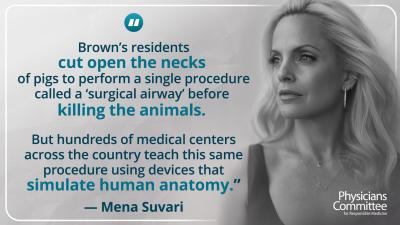Animal Use for Medical Training at University of Virginia Prompts Federal Complaint
Physicians Group Urges Use of Human-Relevant Methods Instead

CHARLOTTESVILLE, Va.—The Physicians Committee for Responsible Medicine—a national nonprofit of more than 12,000 doctors—has filed a federal complaint regarding the use of live animals for training general surgery residents at the University of Virginia (UVA). According to the complaint, this use of animals is in violation of the Animal Welfare Act. The group recommends the university use methods modeled on human anatomy like those employed by the majority of programs across the United States, including every other surgery residency in Virginia.
UVA directs physicians-in-training to perform invasive surgical procedures on live pigs despite significant anatomical differences. Compared to humans, pigs have smaller torsos, lighter limbs, and thicker skin. There are also important differences in the anatomy of the head and neck, internal organs, rib cage, blood vessels, and the airway.
Currently, 73 percent (154 of 212) of surveyed surgery residency programs in the U.S. exclude live animal use from training. Other Virginia programs use only human-based training methods—including Carilion Clinic-Virginia Tech, Eastern Virginia Medical School, Inova Fairfax Medical Campus, Naval Medical Center Portsmouth, and Virginia Commonwealth University. Instead of animals, human-patient simulators, laparoscopic simulators, virtual reality simulators, and human cadavers are widely used. Simulators accurately mimic human anatomy and can include layers of lifelike skin, fat, and muscle. UVA already has a state-of-the-art facility—the Medical Simulation Center—which offers a range of training options that could replace animal use in the general surgery residency.
“This isn’t a choice between ethical medical training and effective medical training,” said Physicians Committee director of academic affairs, John Pippin, MD, FACC. “The nonanimal methods employed by more than 150 surveyed surgery residencies actually replicate human anatomy and physiology, much more so than an anesthetized member of a different species ever could.”
The Animal Welfare Act requires that course instructors consider alternatives to the use of animals for such training and justify such use when alternatives are available. The Physicians Committee’s complaint, which is being filed with the U.S. Department of Agriculture Animal and Plant Health Inspection Service, cites violations of the Animal Welfare Act and inadequate oversight of the training protocol by the school’s animal care and use committee.
For a copy of the complaint or to speak with Dr. Pippin, please contact Reina Pohl at 202-527-7326 or rpohl [at] pcrm.org (rpohl[at]pcrm[dot]org).
Media Contact
Reina Pohl, MPH
202-527-7326
rpohl[at]pcrm.org
Founded in 1985, the Physicians Committee for Responsible Medicine is a nonprofit organization that promotes preventive medicine, conducts clinical research, and encourages higher standards for ethics and effectiveness in education and research.







